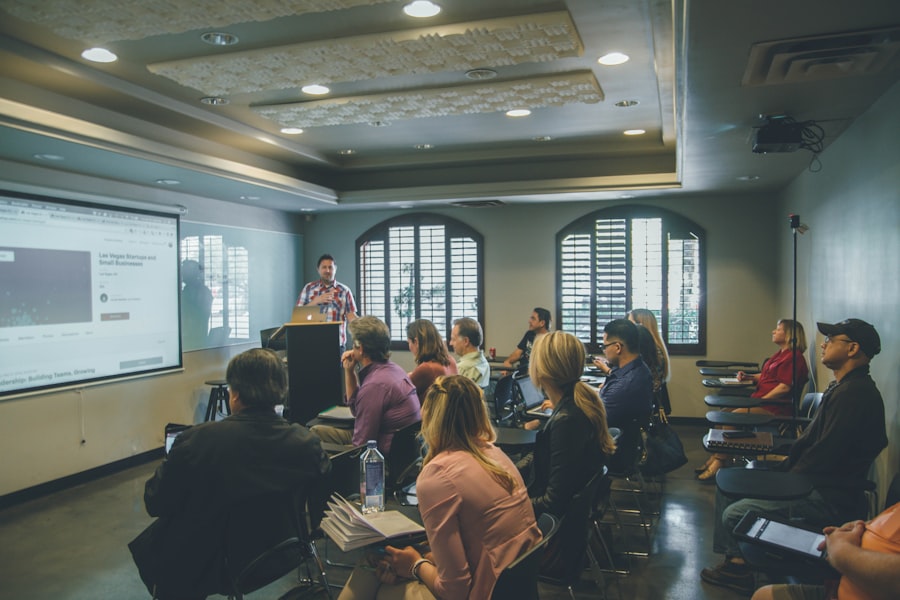Before an interview, it is essential to thoroughly research the company and the position you are applying for. Begin by exploring the company’s website to learn about their mission, values, and recent developments. Take note of ongoing projects, products, or services, as well as recent accomplishments or challenges.
This preparation demonstrates genuine interest and helps align your responses with the company’s objectives during the interview. It is equally important to research the specific role you are pursuing. Understand the key responsibilities, required skills, and qualifications for the position.
This knowledge enables you to confidently discuss how your experience and expertise make you a suitable candidate. Additionally, investigating the company’s culture and work environment provides insight into whether it aligns with your professional goals and values. Conducting comprehensive research allows you to ask informed questions during the interview and showcase your enthusiasm for the opportunity.
This preparation enhances your ability to engage in meaningful discussions about the company and the role, increasing your chances of making a positive impression on the interviewer.
Key Takeaways
- Research the company’s background, values, and the role you are applying for to show your interest and preparedness
- Practice common interview questions to articulate your skills and experiences effectively
- Prepare a concise elevator pitch to introduce yourself and highlight your strengths
- Dress appropriately for the interview to make a good first impression
- Bring multiple copies of your resume and references to provide to the interviewer if needed
- Arrive early and maintain a professional demeanor throughout the interview process
- Follow up with a thank-you note or email to express your gratitude and reiterate your interest in the position
Practice Common Interview Questions
Common Interview Questions
One of the most effective ways to prepare for an interview is to practice answering common interview questions. Although you can’t predict the exact questions you’ll be asked, there are certain ones that tend to come up frequently. These may include questions about your strengths and weaknesses, previous work experience, ability to work in a team, and problem-solving skills.
Practicing Your Responses
By practicing your responses to these types of questions, you can feel more confident and articulate during the actual interview. Consider asking a friend or family member to conduct a mock interview with you, using a list of common interview questions as a guide. This will give you the opportunity to practice formulating your responses out loud and receive feedback on your delivery.
Recording Yourself
Additionally, consider recording yourself answering these questions and then reviewing the footage to identify areas for improvement. The more you practice, the more comfortable and prepared you’ll feel when it comes time for the real interview.
Prepare Your Elevator Pitch

An elevator pitch is a brief, persuasive speech that you can use to spark interest in who you are and what you do. It’s called an elevator pitch because it should be short enough to present during a brief elevator ride. When preparing for an interview, it’s essential to have a strong elevator pitch ready to go.
This pitch should succinctly summarize who you are, what you do, and what makes you unique. Your elevator pitch should highlight your key skills, experiences, and accomplishments in a way that is engaging and memorable. It should also convey your passion for your work and your enthusiasm for the opportunity at hand.
Practice delivering your elevator pitch with confidence and clarity so that you can seamlessly integrate it into the conversation during your interview. A well-crafted elevator pitch can leave a lasting impression on the interviewer and set the stage for a successful interview.
Dress Appropriately
First impressions are crucial in an interview, and your appearance plays a significant role in shaping those initial perceptions. It’s important to dress appropriately for the industry and company culture you’re interviewing with. If you’re unsure about the dress code, it’s always better to err on the side of being slightly overdressed rather than underdressed.
A general rule of thumb is to opt for professional attire such as a suit or business casual attire, depending on the company’s dress code. When selecting your outfit, pay attention to details such as cleanliness, fit, and overall presentation. Ensure that your clothing is well-pressed and free of wrinkles or stains.
Choose conservative colors and avoid flashy accessories or clothing that may be distracting. Your goal is to present yourself as polished, professional, and respectful of the opportunity at hand. By dressing appropriately, you demonstrate that you take the interview seriously and are committed to making a positive impression.
Bring Copies of Your Resume and References
It’s always a good idea to bring multiple copies of your resume and a list of references to an interview. Even if you’ve already submitted these documents electronically, having physical copies on hand shows that you’re prepared and organized. Additionally, it allows you to easily reference specific details from your resume during the interview without having to rely on memory alone.
When preparing your resume copies, use high-quality paper and ensure that they are free of any creases or smudges. Consider placing them in a professional folder or portfolio to keep them neat and protected. As for your list of references, make sure it includes the names, titles, contact information, and a brief description of your relationship with each reference.
Having these materials readily available demonstrates your attention to detail and readiness to provide any additional information that may be requested during the interview.
Arrive Early and Be Professional

Arrival and First Impressions
Punctuality is crucial when it comes to making a positive impression in an interview setting. Plan to arrive at least 10-15 minutes early to allow for any unexpected delays such as traffic or finding parking. Arriving early not only shows that you respect the interviewer’s time but also gives you a few moments to collect yourself and mentally prepare before the interview begins.
Professional Demeanor and Behavior
When you arrive at the interview location, be mindful of your demeanor and behavior. Greet receptionists or staff members politely and professionally, as their feedback may be considered by the hiring team. Once in the interview room, wait to be invited to sit down before taking a seat, and maintain good posture throughout the conversation.
Engagement and Respect
Be attentive, engaged, and respectful of the interviewer’s time by refraining from checking your phone or fidgeting during the discussion.
Follow Up After the Interview
After the interview has concluded, it’s important to follow up with a thank-you note or email expressing your gratitude for the opportunity to interview. This gesture not only demonstrates your appreciation for being considered but also allows you to reiterate your interest in the position and briefly reinforce why you believe you’re a strong fit. In your thank-you message, personalize your expressions of gratitude by referencing specific aspects of the interview that resonated with you or reiterating any key points from your conversation.
Keep your message concise, genuine, and professional in tone. Sending a thank-you note shows that you are courteous, proactive, and genuinely interested in the opportunity. It also keeps you fresh in the interviewer’s mind as they make their final decisions.
In conclusion, preparing for an interview requires thorough research, practice, and attention to detail. By investing time in these preparations, you can enter the interview with confidence, professionalism, and a strong foundation for success. Remember that each step of preparation contributes to creating a positive impression and showcasing your qualifications effectively.
With careful planning and readiness, you can maximize your chances of making a lasting impact during the interview process.
If you’re looking to stand out in a competitive job market, it’s important to understand what employers are looking for in potential candidates. This article on graduate recruitment and what employers look for provides valuable insights into the qualities and skills that are highly sought after by employers. Understanding these job roles and the expectations of employers can help you better prepare for job interviews and increase your chances of success in a competitive market.
FAQs
What are some tips for preparing for job interviews in a competitive market?
– Research the company and the role you are applying for
– Practice common interview questions and prepare your answers
– Dress professionally and appropriately for the interview
– Bring copies of your resume and any relevant documents
– Prepare questions to ask the interviewer
– Practice good body language and communication skills
How can I stand out in a competitive job market?
– Highlight your unique skills and experiences that make you a strong candidate
– Show enthusiasm and passion for the role and the company
– Demonstrate your ability to adapt and learn quickly
– Network and make connections within the industry
– Customize your resume and cover letter for each application
– Follow up with a thank-you note after the interview
What are some common mistakes to avoid in a job interview?
– Arriving late or unprepared
– Speaking negatively about previous employers or experiences
– Failing to research the company and the role
– Not asking questions or showing interest in the company
– Using unprofessional language or behavior
– Failing to follow up after the interview



